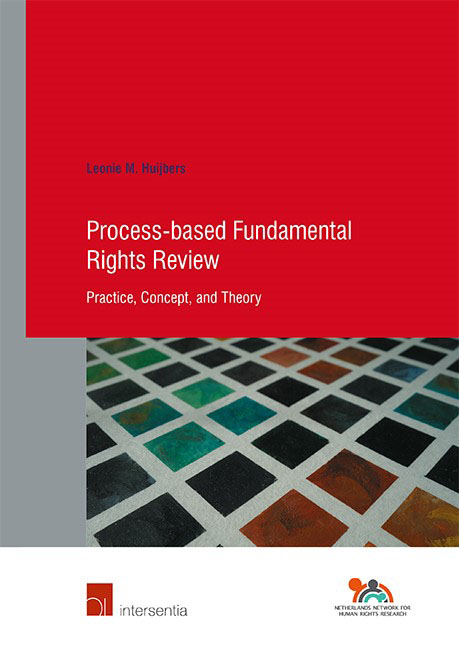Book contents
- Frontmatter
- Acknowledgments
- Contents
- List of Abbreviations
- INTRODUCTION
- PART I THE PRACTICE OF PROCESS-BASED FUNDAMENTAL RIGHTS REVIEW
- PART II THE CONCEPT OF PROCESS-BASED FUNDAMENTAL RIGHTS REVIEW
- PART III THE THEORY ON PROCESS-BASED FUNDAMENTAL RIGHTS REVIEW
- CONCLUSION
- Addendum: Questions for ECtHR Judges
- Summary
- Samenvatting
- Bibliography
- Official Documents
- Case-Law (by Jurisdiction)
- Case-Law (by Name)
- Curriculum vitae
- Human Rights Research Series
- Index
Chapter 4 - Process-based Fundamental Rights Review of Judicial Procedures
Published online by Cambridge University Press: 11 November 2021
- Frontmatter
- Acknowledgments
- Contents
- List of Abbreviations
- INTRODUCTION
- PART I THE PRACTICE OF PROCESS-BASED FUNDAMENTAL RIGHTS REVIEW
- PART II THE CONCEPT OF PROCESS-BASED FUNDAMENTAL RIGHTS REVIEW
- PART III THE THEORY ON PROCESS-BASED FUNDAMENTAL RIGHTS REVIEW
- CONCLUSION
- Addendum: Questions for ECtHR Judges
- Summary
- Samenvatting
- Bibliography
- Official Documents
- Case-Law (by Jurisdiction)
- Case-Law (by Name)
- Curriculum vitae
- Human Rights Research Series
- Index
Summary
INTRODUCTION
Both at the national and international level procedural requirements for judicial decision-making are set out in legislation, regulations, and guidelines, or are developed in judicial practice. These procedural requirements concern, for example, the need for courts to give reasons for their judgments and to hear the parties to a case, or to take into account the evidence provided by applicants, experts, or witnesses. Process-based review of judicial decision-making procedures can be explained partly by referring to the courts’ task in ensuring compliance with such procedural rights and standards by lower courts. Consequently, review of judicial decision-making processes will be particularly visible in judgments of courts of appeal, of highest national courts, and of international courts. After all, before a case reaches these courts, there has already been a judicial decision by at least one lower court. Indeed, some highest national courts focus solely on the judicial decision-making process of the lower courts, since they lack the competence to establish the facts or decide on the merits of the case themselves. This is also true for the ‘courts of cassation’ that exist in various legal systems. This chapter provides examples of review of judicial decision-making procedures in fundamental rights cases. It discusses cases from the Supreme Court of Argentina, the Spanish Constitutional Court, the GFCC, the CSC, the UN Committee on Economic, Social, and Cultural Rights, the ECJ, the ECtHR, and, finally, the Inter-American Court of Human Rights. The main findings of the chapter are briefly summarised in a conclusion.
EXAMPLES OF REVIEW OF JUDICIAL PROCEDURES
SUPREME COURT OF ARGENTINA: COMUNIDAD INDÍGENA EBEN EZER
A first example of process-based fundamental rights review at the national level can be found in relation to the ‘accion de amparo’ or ‘recurso de amparo’ procedures in Latin American States. These procedures for so-called ‘petitions for constitutional protection’ originated from the 1857 Constitution of Mexico, but can now be found in all Latin American countries, except Cuba. It has been defined as an ‘extraordinary judicial remedy specifically conceived for the protection of constitutional rights against harms or threats inflicted by authorities or individuals’ and it concludes with a judicial decision or ‘writ of protection’. An example of an amparo procedure in which procedural reasoning is applied can be found in the Argentinian context.
- Type
- Chapter
- Information
- Process-based Fundamental Rights ReviewPractice, Concept, and Theory, pp. 65 - 82Publisher: IntersentiaPrint publication year: 2021

